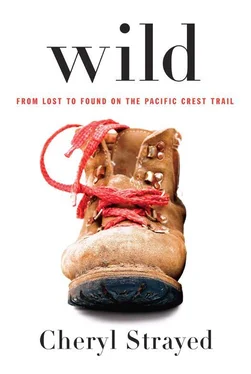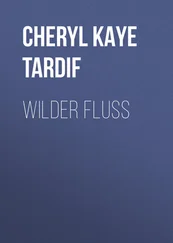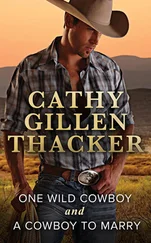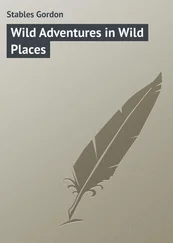Cheryl Strayed - Wild
Здесь есть возможность читать онлайн «Cheryl Strayed - Wild» весь текст электронной книги совершенно бесплатно (целиком полную версию без сокращений). В некоторых случаях можно слушать аудио, скачать через торрент в формате fb2 и присутствует краткое содержание. Год выпуска: 2012, ISBN: 2012, Жанр: Современная проза, на английском языке. Описание произведения, (предисловие) а так же отзывы посетителей доступны на портале библиотеки ЛибКат.
- Название:Wild
- Автор:
- Жанр:
- Год:2012
- ISBN:978-0-307-95765-8
- Рейтинг книги:4 / 5. Голосов: 1
-
Избранное:Добавить в избранное
- Отзывы:
-
Ваша оценка:
- 80
- 1
- 2
- 3
- 4
- 5
Wild: краткое содержание, описание и аннотация
Предлагаем к чтению аннотацию, описание, краткое содержание или предисловие (зависит от того, что написал сам автор книги «Wild»). Если вы не нашли необходимую информацию о книге — напишите в комментариях, мы постараемся отыскать её.
Wild — читать онлайн бесплатно полную книгу (весь текст) целиком
Ниже представлен текст книги, разбитый по страницам. Система сохранения места последней прочитанной страницы, позволяет с удобством читать онлайн бесплатно книгу «Wild», без необходимости каждый раз заново искать на чём Вы остановились. Поставьте закладку, и сможете в любой момент перейти на страницу, на которой закончили чтение.
Интервал:
Закладка:
“It is what I told myself,” I said. “Except every once in while,” I added. “When I was.”
“Me too.” He reached over and rested his hand on my shoulder and I put my hand on his and squeezed it. He felt like a brother of mine, but not at all like my actual brother. He seemed like someone I’d always know even if I never saw him again.
When we were done with the wine, I went to Monster and pulled out the ziplock bag that held my books. “You need something to read?” I asked Doug, holding The Ten Thousand Things up to him, but he shook his head. I’d finished it a few days before, though I hadn’t been able to burn it because of the rain. Unlike most of the other books I’d read on my hike, I’d already read The Ten Thousand Things when I’d packed it into my resupply box months before. A densely lyrical novel set on the Moluccan Islands in Indonesia, it had been written in Dutch and published to critical acclaim in 1955, but mostly forgotten now. I’d never met anyone who’d read the book, aside from the college writing professor who’d assigned it to me in the fiction workshop I was enrolled in when my mother got sick. The title hadn’t been lost on me as I’d sat dutifully reading it in my mother’s hospital room, attempting to shut out my fear and sorrow by forcing my mind to focus on passages I hoped to refer to in the following week’s class discussion, but it was useless. I couldn’t think of anything but my mom. Besides, I already knew about the ten thousand things. They were all the named and unnamed things in the world and together they added up to less than how much my mother loved me. And me her. So when I was packing for the PCT, I’d decided to give the book another chance. I hadn’t had any trouble focusing this time. From the very first page, I understood. Each of Dermoût’s sentences came at me like a soft knowing dagger, depicting a far-off land that felt to me like the blood of all the places I used to love.
“I think I’m going to turn in,” said Doug, holding the empty bottle of wine. “Tom’ll probably catch up to us tomorrow.”
“I’ll put the fire out,” I said.
When he was gone, I ripped the pages of The Ten Thousand Things from their gummy paperback binding and set them into the fire in thin clumps, prodding them with a stick until they burned. As I stared at the flames, I thought about Eddie, the same as I did just about every time I sat by a fire. It had been he who’d taught me how to build one. Eddie was the one who’d taken me camping the first time. He’d shown me how to pitch a tent and tie a knot in a rope. From him, I’d learned how to open a can with a jackknife and paddle a canoe and skip a rock on the surface of a lake. In the three years after he fell in love with my mother, he’d taken us camping and canoeing along the Minnesota and St. Croix and Namekagon rivers practically every weekend from June to September, and after we’d moved north onto the land my family had bought with the proceeds from his broken back, he’d taught me even more about the woods.
There’s no way to know what makes one thing happen and not another. What leads to what. What destroys what. What causes what to flourish or die or take another course. But I was pretty certain as I sat there that night that if it hadn’t been for Eddie, I wouldn’t have found myself on the PCT. And though it was true that everything I felt for him sat like a boulder in my throat, this realization made the boulder sit ever so much lighter. He hadn’t loved me well in the end, but he’d loved me well when it mattered.
When The Ten Thousand Things had turned to ash, I pulled out the other book in my ziplock bag. It was The Dream of a Common Language . I’d carried it all this way, though I hadn’t opened it since that first night on the trail. I hadn’t needed to. I knew what it said. Its lines had run all summer through the mix-tape radio station in my head, fragments from various poems or sometimes the title of the book itself, which was also a line from a poem: the dream of a common language . I opened the book and paged through it, leaning forward so I could see the words by the firelight. I read a line or two from a dozen or so of the poems, each of them so familiar they gave me a strange sort of comfort. I’d chanted those lines silently through the days while I hiked. Often, I didn’t know exactly what they meant, yet there was another way in which I knew their meaning entirely, as if it were all before me and yet out of my grasp, their meaning like a fish just beneath the surface of the water that I tried to catch with my bare hands — so close and present and belonging to me — until I reached for it and it flashed away.
I closed the book and looked at its beige cover. There was no reason not to burn this book too.
Instead, I only hugged it to my chest.
We reached Timberline Lodge a couple of days later. By then it wasn’t just Doug and me. Tom had caught up to us, and we’d also been joined by two women — a twenty-something ex-couple who were hiking Oregon and a small section of Washington. The five of us hiked together in duos and trios of various formations, or sometimes all of us in a row, making a leisurely party of it, the vibe festive because of our numbers and the cool sunny days. On our long breaks we played hacky sack and skinny-dipped in an icy-cold lake, incited the wrath of a handful of hornets and then ran from them while we laughed and screamed. By the time we reached Timberline Lodge 6,000 feet up on the south flank of Mount Hood, we were like a tribe, bonded in that way I imagined kids felt when they spent a week together at summer camp.
It was midafternoon when we arrived. In the lounge the five of us took over a pair of couches that faced each other across a low wooden table and ordered terribly expensive sandwiches, then afterwards sipped coffees spiked with Baileys while we played poker and rummy five hundred with a deck of cards we borrowed from the bartender. The slope of Mount Hood rose above us just outside the lodge’s windows. At 11,240 feet, it’s Oregon’s highest mountain — a volcano like all the others I’d passed since I entered the Cascade Range south of Lassen Peak way back in July — but this, the last of the major mountains I’d traverse on my hike, felt like the most important, and not only because I was sitting on its very haunches. The sight of it had become familiar to me, its imposing grandeur visible from Portland on clear days. Once I reached Mount Hood I realized I felt ever so slightly like I was home. Portland — where I’d never technically lived, in spite of all that had happened in the eight or nine months I’d spent there over the past two years — was only sixty miles away.
From afar, the sight of Mount Hood had never failed to take my breath away, but up close it was different, the way everything is. It was less coolly majestic, at once more ordinary and more immeasurable in its gritty authority. The landscape outside the north windows of the lodge was not the glistening white peak one sees from miles away, but a grayish and slightly barren slope dotted with a few scraggly stands of pines and a smattering of lupine and asters that grew among the rocks. The natural landscape was punctuated by a ski lift that led to the crusty swath of snow farther up. I was happy to be protected from the mountain for a time, ensconced inside the glorious lodge, a wonderland in the rough. It’s a grand stone-and-wood structure that was hand-hewn by Works Progress Administration workers in the mid-1930s. Everything about the place has a story. The art on the walls, the architecture of the building, the handwoven fabrics that cover the furniture — each piece carefully crafted to reflect the history, culture, and natural resources of the Pacific Northwest.
Читать дальшеИнтервал:
Закладка:
Похожие книги на «Wild»
Представляем Вашему вниманию похожие книги на «Wild» списком для выбора. Мы отобрали схожую по названию и смыслу литературу в надежде предоставить читателям больше вариантов отыскать новые, интересные, ещё непрочитанные произведения.
Обсуждение, отзывы о книге «Wild» и просто собственные мнения читателей. Оставьте ваши комментарии, напишите, что Вы думаете о произведении, его смысле или главных героях. Укажите что конкретно понравилось, а что нет, и почему Вы так считаете.












